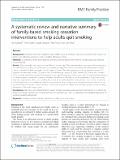Files in this item
A systematic review and narrative summary of family-based smoking cessation interventions to help adults quit smoking
Item metadata
| dc.contributor.author | Hubbard, Gill | |
| dc.contributor.author | Gorely, Trish | |
| dc.contributor.author | Ozakinci, Gozde | |
| dc.contributor.author | Polson, Rob | |
| dc.contributor.author | Forbat, Liz | |
| dc.date.accessioned | 2016-06-28T10:30:05Z | |
| dc.date.available | 2016-06-28T10:30:05Z | |
| dc.date.issued | 2016-06-24 | |
| dc.identifier | 241610257 | |
| dc.identifier | b209032a-cb0e-4e8f-bec9-de089d9ffd39 | |
| dc.identifier | 84978179928 | |
| dc.identifier | 000378675600001 | |
| dc.identifier.citation | Hubbard , G , Gorely , T , Ozakinci , G , Polson , R & Forbat , L 2016 , ' A systematic review and narrative summary of family-based smoking cessation interventions to help adults quit smoking ' , BMC Family Practice , vol. 17 , 73 . https://doi.org/10.1186/s12875-016-0457-4 | en |
| dc.identifier.issn | 1471-2296 | |
| dc.identifier.other | ORCID: /0000-0001-5869-3274/work/27163463 | |
| dc.identifier.uri | https://hdl.handle.net/10023/9055 | |
| dc.description.abstract | Background: Smoking is the most significant preventable cause of morbidity and early mortality in the world. The family is an influential context in which smoking behaviour occurs. Methods: A systematic review and narrative summary of family-based interventions to help adults quit smoking was conducted. Results: Eight controlled trials were included. Risk of bias was high. The smoking-related outcome of the intervention was self-reported smoking status/abstinence, validated by objective measures (including saliva thiocynate or breath carbon monoxide). Follow-up ranged from six weeks to five years. The main target groups were: pregnant women (1), pregnant women who smoked (2), men at risk of cardiovascular disease (2), adult smokers (1), parents who smoked (1) and couples who both smoked (1). Interventions included family members but most did not go further by drawing on family, systemic or relational theories to harness the influence of family on smoking behaviour. Only three studies directly compared the effects on smoking behaviour of a family-based (i.e. interventions that involve a member of the family) versus an individual-based (i.e. interventions that use behaviour change techniques that focus on the individual) intervention. None of these studies found significant differences between groups on the smoking behaviour of the main target group. Conclusions: We have yet to develop family-based smoking cessation interventions that harness or re-direct the influence of family members on smoking behaviour in a positive way. Thus, it is likely that individualised-approaches to smoking cessation will prevail. | |
| dc.format.extent | 20 | |
| dc.format.extent | 845398 | |
| dc.language.iso | eng | |
| dc.relation.ispartof | BMC Family Practice | en |
| dc.subject | Smoking cessation | en |
| dc.subject | Family | en |
| dc.subject | Intervention studies | en |
| dc.subject | Systematic review | en |
| dc.subject | HQ The family. Marriage. Woman | en |
| dc.subject | RA0421 Public health. Hygiene. Preventive Medicine | en |
| dc.subject | NDAS | en |
| dc.subject | SDG 3 - Good Health and Well-being | en |
| dc.subject.lcc | HQ | en |
| dc.subject.lcc | RA0421 | en |
| dc.title | A systematic review and narrative summary of family-based smoking cessation interventions to help adults quit smoking | en |
| dc.type | Journal article | en |
| dc.contributor.institution | University of St Andrews. St Andrews Sustainability Institute | en |
| dc.contributor.institution | University of St Andrews. School of Medicine | en |
| dc.contributor.institution | University of St Andrews. Health Psychology | en |
| dc.identifier.doi | https://doi.org/10.1186/s12875-016-0457-4 | |
| dc.description.status | Peer reviewed | en |
| dc.date.embargoedUntil | 2016-06-24 |
This item appears in the following Collection(s)
Items in the St Andrews Research Repository are protected by copyright, with all rights reserved, unless otherwise indicated.

